肯定句变一般疑问句的规则练习
- 格式:ppt
- 大小:334.50 KB
- 文档页数:1
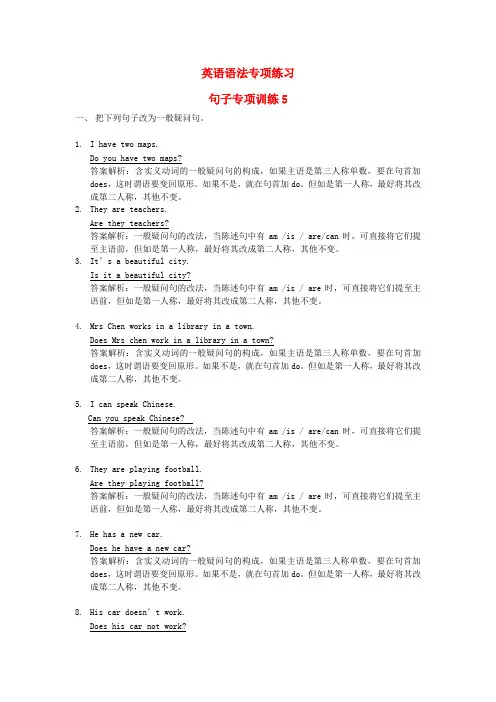
英语语法专项练习句子专项训练5一、把下列句子改为一般疑问句。
1.I have two maps.Do you have two maps?答案解析:含实义动词的一般疑问句的构成,如果主语是第三人称单数,要在句首加does,这时谓语要变回原形。
如果不是,就在句首加do。
但如是第一人称,最好将其改成第二人称,其他不变。
2.They are teachers.Are they teachers?答案解析:一般疑问句的改法,当陈述句中有am /is / are/can时,可直接将它们提至主语前,但如是第一人称,最好将其改成第二人称,其他不变。
3.It’s a beautiful city.Is it a beautiful city?答案解析:一般疑问句的改法,当陈述句中有am /is / are时,可直接将它们提至主语前,但如是第一人称,最好将其改成第二人称,其他不变。
4.Mrs Chen works in a library in a town.Does Mrs chen work in a library in a town?答案解析:含实义动词的一般疑问句的构成,如果主语是第三人称单数,要在句首加does,这时谓语要变回原形。
如果不是,就在句首加do。
但如是第一人称,最好将其改成第二人称,其他不变。
5.I can speak Chinese.Can you speak Chinese?答案解析:一般疑问句的改法,当陈述句中有am /is / are/can时,可直接将它们提至主语前,但如是第一人称,最好将其改成第二人称,其他不变。
6.They are playing football.Are they playing football?答案解析:一般疑问句的改法,当陈述句中有am /is / are时,可直接将它们提至主语前,但如是第一人称,最好将其改成第二人称,其他不变。
7.He has a new car.Does he have a new car?答案解析:含实义动词的一般疑问句的构成,如果主语是第三人称单数,要在句首加does,这时谓语要变回原形。
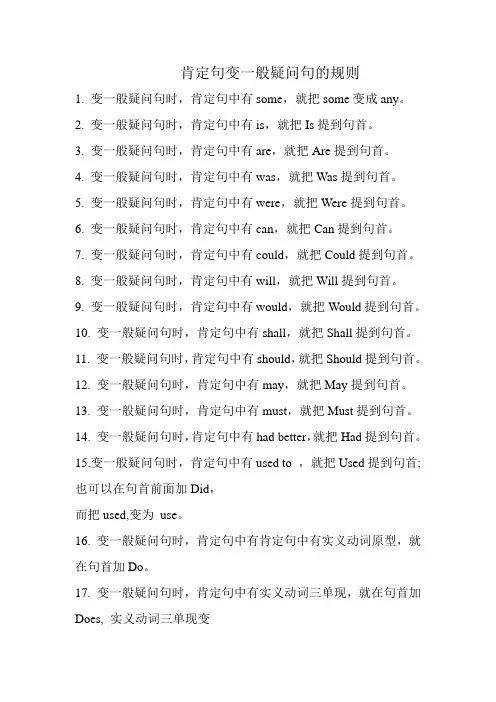
肯定句变一般疑问句的规则1. 变一般疑问句时,肯定句中有some,就把some变成any。
2. 变一般疑问句时,肯定句中有is,就把Is提到句首。
3. 变一般疑问句时,肯定句中有are,就把Are提到句首。
4. 变一般疑问句时,肯定句中有was,就把Was提到句首。
5. 变一般疑问句时,肯定句中有were,就把Were提到句首。
6. 变一般疑问句时,肯定句中有can,就把Can提到句首。
7. 变一般疑问句时,肯定句中有could,就把Could提到句首。
8. 变一般疑问句时,肯定句中有will,就把Will提到句首。
9. 变一般疑问句时,肯定句中有would,就把Would提到句首。
10. 变一般疑问句时,肯定句中有shall,就把Shall提到句首。
11. 变一般疑问句时,肯定句中有should,就把Should提到句首。
12. 变一般疑问句时,肯定句中有may,就把May提到句首。
13. 变一般疑问句时,肯定句中有must,就把Must提到句首。
14. 变一般疑问句时,肯定句中有had better,就把Had提到句首。
15.变一般疑问句时,肯定句中有used to ,就把Used提到句首;也可以在句首前面加Did,而把used,变为use。
16. 变一般疑问句时,肯定句中有肯定句中有实义动词原型,就在句首加Do。
17. 变一般疑问句时,肯定句中有实义动词三单现,就在句首加Does, 实义动词三单现变回实义动词原型。
18. 变一般疑问句时,肯定句中有实义动词过去式,就在句首加Did, 实义动词过去式变回实义动词原型。
19. 变一般疑问句时,肯定句是I am… ,就把I am…变成Are you….。
20. 变一般疑问句时,肯定句I was… ,就把I was…变成Were you…。
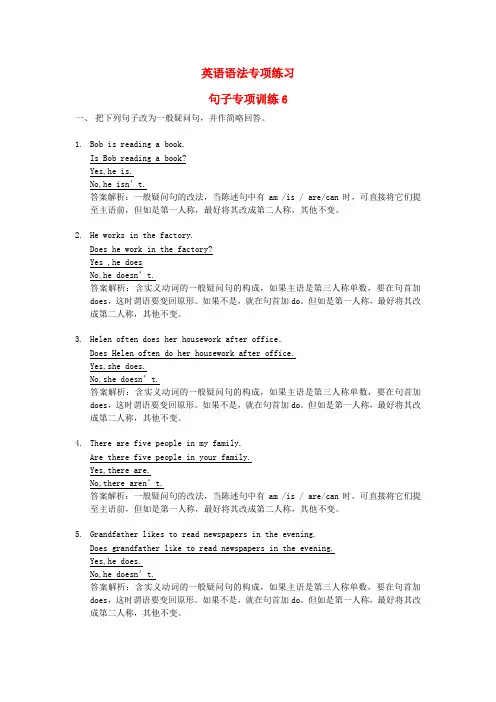
英语语法专项练习句子专项训练6一、把下列句子改为一般疑问句,并作简略回答。
1.Bob is reading a book.Is Bob reading a book?Yes,he is.No,he isn’t.答案解析:一般疑问句的改法,当陈述句中有am /is / are/can时,可直接将它们提至主语前,但如是第一人称,最好将其改成第二人称,其他不变。
2.He works in the factory.Does he work in the factory?Yes ,he doesNo,he doesn’t.答案解析:含实义动词的一般疑问句的构成,如果主语是第三人称单数,要在句首加does,这时谓语要变回原形。
如果不是,就在句首加do。
但如是第一人称,最好将其改成第二人称,其他不变。
3.Helen often does her housework after office.Does Helen often do her housework after office.Yes,she does.No,she doesn’t.答案解析:含实义动词的一般疑问句的构成,如果主语是第三人称单数,要在句首加does,这时谓语要变回原形。
如果不是,就在句首加do。
但如是第一人称,最好将其改成第二人称,其他不变。
4.There are five people in my family.Are there five people in your family.Yes,there are.No,there aren’t.答案解析:一般疑问句的改法,当陈述句中有am /is / are/can时,可直接将它们提至主语前,但如是第一人称,最好将其改成第二人称,其他不变。
5.Grandfather likes to read newspapers in the evening.Does grandfather like to read newspapers in the evening.Yes,he does.No,he doesn’t.答案解析:含实义动词的一般疑问句的构成,如果主语是第三人称单数,要在句首加does,这时谓语要变回原形。
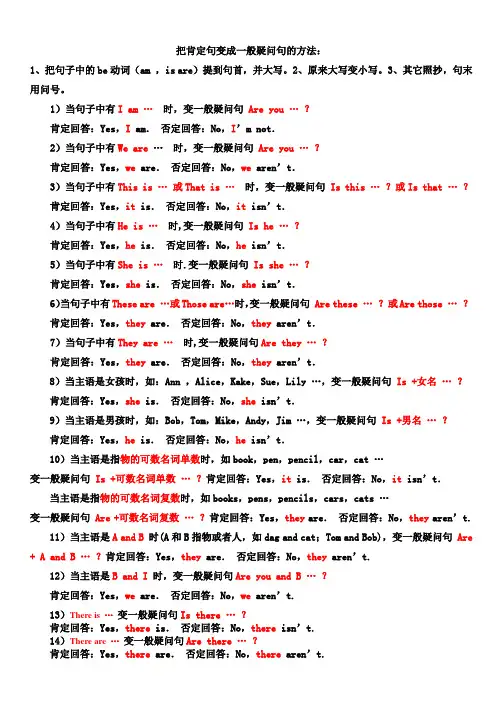
把肯定句变成一般疑问句的方法:1、把句子中的be动词(am ,is are)提到句首,并大写。
2、原来大写变小写。
3、其它照抄,句末用问号。
1)当句子中有I am …时,变一般疑问句Are you …?肯定回答:Yes,I am.否定回答:No,I’m not.2)当句子中有We are…时,变一般疑问句Are you …?肯定回答:Yes,we are.否定回答:No,we aren’t.3)当句子中有This is …或That is …时,变一般疑问句Is this …?或Is that …?肯定回答:Yes,it is.否定回答:No,it isn’t.4)当句子中有He is …时,变一般疑问句Is he …?肯定回答:Yes,he is.否定回答:No,he isn’t.5)当句子中有She is …时.变一般疑问句Is she …?肯定回答:Yes,she is.否定回答:No,she isn’t.6)当句子中有These are …或Those are…时,变一般疑问句Are these …?或Are those …?肯定回答:Yes,they are.否定回答:No,they aren’t.7)当句子中有They are …时,变一般疑问句Are they …?肯定回答:Yes,they are.否定回答:No,they aren’t.8)当主语是女孩时,如:Ann ,Alice,Kake,Sue,Lily …,变一般疑问句Is +女名…?肯定回答:Yes,she is.否定回答:No,she isn’t.9)当主语是男孩时,如:Bob,Tom,Mike,Andy,Jim …,变一般疑问句Is +男名…?肯定回答:Yes,he is.否定回答:No,he isn’t.10)当主语是指物的可数名词单数时,如book,pen,pencil,car,cat …变一般疑问句Is +可数名词单数…?肯定回答:Yes,it is.否定回答:No,it isn’t.当主语是指物的可数名词复数时,如books,pens,pencils,cars,cats …变一般疑问句Are +可数名词复数…?肯定回答:Yes,they are.否定回答:No,they aren’t.11)当主语是A and B 时(A和B指物或者人,如dag and cat;Tom and Bob),变一般疑问句Are + A and B …?肯定回答:Yes,they are.否定回答:No,they aren’t.12)当主语是B and I 时,变一般疑问句Are you and B…?肯定回答:Yes,we are.否定回答:No,we aren’t.13)There is …变一般疑问句Is there…?肯定回答:Yes,there is.否定回答:No,there isn’t.14)There are …变一般疑问句Are there…?肯定回答:Yes,there are.否定回答:No,there aren’t.。
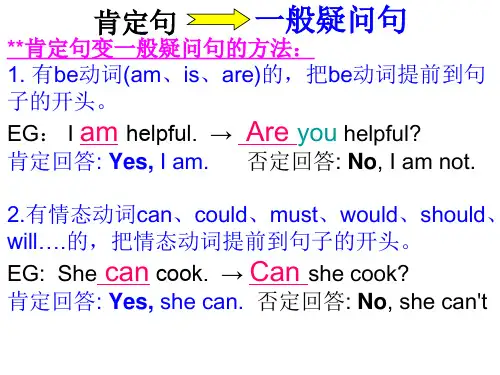
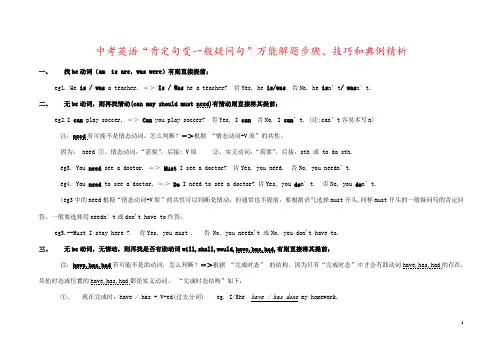
中考英语“肯定句变一般疑问句”万能解题步骤、技巧和典例精析一、找be动词(am is are,was were)有则直接提前;eg1. He is / was a teacher. =>Is / Was he a teacher? 肯Yes, he is/was否No, he is n’t/was n’t.二、无be动词,则再找情动(can may should must need)有情动则直接将其提前;eg2.I can play soccer. =>Can you play soccer? 肯Yes, I can否No, I can’t. (注:can’t容易多写n)注:need有可能不是情态动词,怎么判断?=>根据“情态动词+V原”的共性。
因为: need ①、情态动词:“需要”,后接: V原②、实义动词:“需要”,后接:sth 或 to do sth.eg3. You need see a doctor. =>Must I see a doctor? 肯Yes, you need. 否No, you needn’t.eg4. You need to see a doctor. =>Do I need to see a doctor? 肯Yes, you do n’t. 否No, you do n’t.(eg3中的need根据“情态动词+V原”的共性可以判断是情动,但通常也不提前,要根据语气选择must开头,同样must开头的一般疑问句的否定回答,一般要选择用needn’t或don't have to作答。
eg5.--Must I stay here ? 肯Yes, you must . 否 No, you needn't 或No, you don't have to.三、无be动词,无情动,则再找是否有助动词will,shall,would,have,has,had,有则直接将其提前;注:have,has,had有可能不是助动词,怎么判断?=>根据“完成时态”的结构。
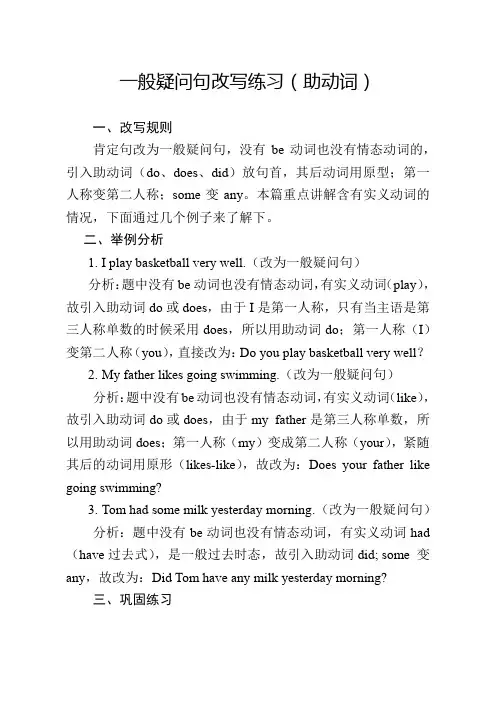
一般疑问句改写练习(助动词)一、改写规则肯定句改为一般疑问句,没有be动词也没有情态动词的,引入助动词(do、does、did)放句首,其后动词用原型;第一人称变第二人称;some变any。
本篇重点讲解含有实义动词的情况,下面通过几个例子来了解下。
二、举例分析1. I play basketball very well.(改为一般疑问句)分析:题中没有be动词也没有情态动词,有实义动词(play),故引入助动词do或does,由于I是第一人称,只有当主语是第三人称单数的时候采用does,所以用助动词do;第一人称(I)变第二人称(you),直接改为:Do you play basketball very well?2.My father likes going swimming.(改为一般疑问句)分析:题中没有be动词也没有情态动词,有实义动词(like),故引入助动词do或does,由于my father是第三人称单数,所以用助动词does;第一人称(my)变成第二人称(your),紧随其后的动词用原形(likes-like),故改为:Does your father like going swimming?3.Tom had some milk yesterday morning.(改为一般疑问句)分析:题中没有be动词也没有情态动词,有实义动词had (have过去式),是一般过去时态,故引入助动词did; some 变any,故改为:Did Tom have any milk yesterday morning?三、巩固练习1.We often talk about our hobbies.(改为一般疑问句)2.I like running and jumping.(改为一般疑问句)3.She comes back home at 6 pm .(改为一般疑问句)4.Daniel has lots of homework.(改为一般疑问句)5.Lily and I go to school on foot.(改为一般疑问句)6.We all have a good time today.(改为一般疑问句)7.His teacher always reads stories in class.(改为一般疑问句)8.I went to Nanjing with my brother last week.(改为一般疑问句)9.He always reads books before bedtime.(改为一般疑问句)10.My uncle teaches English in our school.(改为一般疑问句)11.Lily went to hospital to look after her grandfather last Sunday.(改为一般疑问句)12.Tim’s brother seldom goes shopping with us.(改为一般疑问句)13.The little dog lost its way.(改为一般疑问句)14.We bought some gifts for our teachers. (改为一般疑问句)15.They love going swimming very much.(改为一般疑问句)16.His mum often brings nice sweets for us.(改为一般疑问句)17.The kite flies high in the sky.(改为一般疑问句)18.All of us saw that strange man in our school.(改为一般疑问句)19.Bob and I got the same points.(改为一般疑问句)20.I usually have breakfast at 7o’clock in the morning.(改为一般疑问句)21.She does her homework carefully.(改为一般疑问句)。
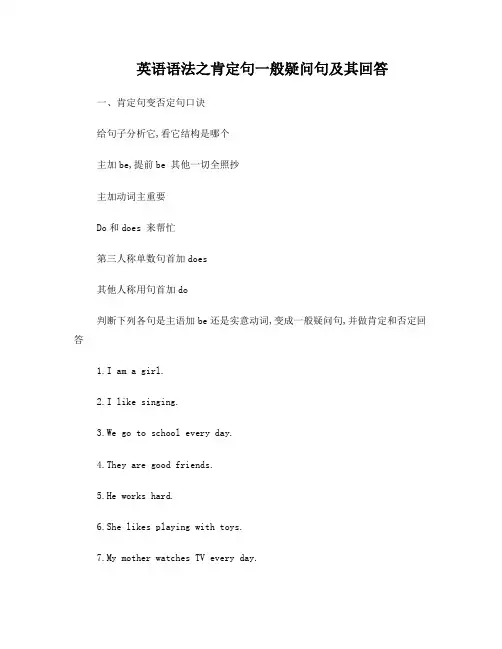
英语语法之肯定句一般疑问句及其回答一、肯定句变否定句口诀给句子分析它,看它结构是哪个主加be,提前be 其他一切全照抄主加动词主重要Do和does 来帮忙第三人称单数句首加does其他人称用句首加do判断下列各句是主语加be还是实意动词,变成一般疑问句,并做肯定和否定回答1.I am a girl.2.I like singing.3.We go to school every day.4.They are good friends.5.He works hard.6.She likes playing with toys.7.My mother watches TV every day.8.You are a beautiful girl.9.Tom is playing football on the playground.10.Bill does his homework after supper.三、肯定句一般疑问句规则肯定句主语+be+其他变成be+主语+其他主语+动词+其他变成Do+主语+动词+其他主语(第三人称单数)+动词单三+其他变成Does+主语(第三人称单数)+动词原形+其他练习:变成一般疑问句,并做肯定和否定回答1.She is watching TV now.2.We go to school on Sunday.3.His father works hard.4.Jack's mother is a nurse.5.The cat runs fast.6.They like reading books.7.My grandpa gives me a hot dog.8.Tom often walks to school.9.I have a doll.10.It is eating fish.一、按要求完成句子(要求:变成一般疑问句,并做肯定和否定回答1. I am a student.→2. They are English cars.、3. This is a pencil-box.4. Its name is Polly.5. Jim is at school.6. These are my English books.7. I know his name.。
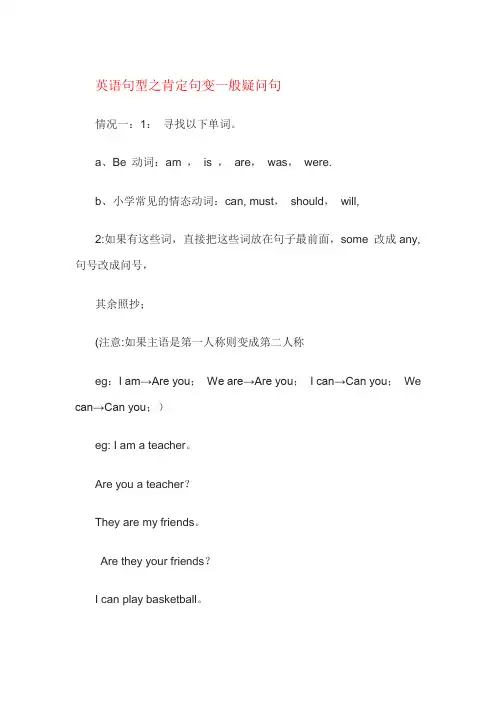
英语句型之肯定句变一般疑问句情况一:1:寻找以下单词。
a、Be 动词:am ,is ,are,was,were.b、小学常见的情态动词:can, must,should,will,2:如果有这些词,直接把这些词放在句子最前面,some 改成any,句号改成问号,其余照抄;(注意:如果主语是第一人称则变成第二人称eg:I am→Are you;We are→Are you;I can→Can you;We can→Can you;)eg: I am a teacher。
Are you a teacher?They are my friends。
Are they your friends?I can play basketball。
Can you play basketball?My sister is watching TV。
Is your sister watching TV?情况二:情况一中单词找不到的句子,在句子前面加助动词do,does,(如何确定助动词用do,does,呢?根据句中动词,动词是原形的就用do,动词是单三形式的就用does)注意:变疑问句时,句中有some,要将some变为any;句中动词用原形.(如果主语是第一人称则变成第二人称)eg:I like the monkeys。
Do you like the monkeys?My sister has a lovely dog。
Does your sister have a lovely dog?I have some bread and milk every morning。
Do you have any bread and milk every morning?。
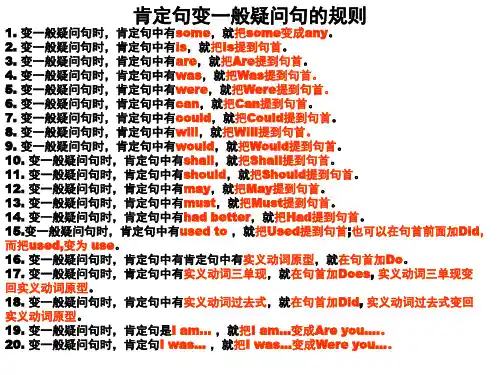
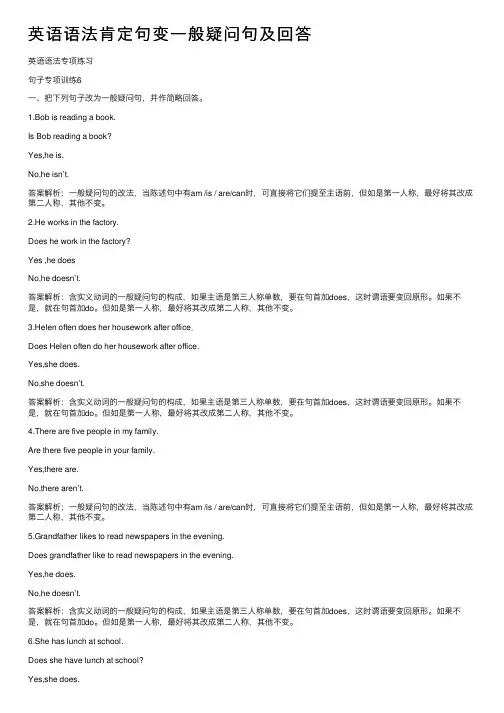
英语语法肯定句变⼀般疑问句及回答英语语法专项练习句⼦专项训练6⼀、把下列句⼦改为⼀般疑问句,并作简略回答。
1.Bob is reading a book.Is Bob reading a book?Yes,he is.No,he isn’t.答案解析:⼀般疑问句的改法,当陈述句中有am /is / are/can时,可直接将它们提⾄主语前,但如是第⼀⼈称,最好将其改成第⼆⼈称,其他不变。
2.He works in the factory.Does he work in the factory?Yes ,he doesNo,he doesn’t.答案解析:含实义动词的⼀般疑问句的构成,如果主语是第三⼈称单数,要在句⾸加does,这时谓语要变回原形。
如果不是,就在句⾸加do。
但如是第⼀⼈称,最好将其改成第⼆⼈称,其他不变。
3.Helen often does her housework after office.Does Helen often do her housework after office.Yes,she does.No,she doesn’t.答案解析:含实义动词的⼀般疑问句的构成,如果主语是第三⼈称单数,要在句⾸加does,这时谓语要变回原形。
如果不是,就在句⾸加do。
但如是第⼀⼈称,最好将其改成第⼆⼈称,其他不变。
4.There are five people in my family.Are there five people in your family.Yes,there are.No,there aren’t.答案解析:⼀般疑问句的改法,当陈述句中有am /is / are/can时,可直接将它们提⾄主语前,但如是第⼀⼈称,最好将其改成第⼆⼈称,其他不变。
5.Grandfather likes to read newspapers in the evening.Does grandfather like to read newspapers in the evening.Yes,he does.No,he doesn’t.答案解析:含实义动词的⼀般疑问句的构成,如果主语是第三⼈称单数,要在句⾸加does,这时谓语要变回原形。
把肯定句变成一般疑问句的方法:1、把句子中的be动词(am,isare)提到句首,并大写。
2、原来大写变小写。
3、其它照抄,句末用问号。
1)当句子中有Iam…时,变一般疑问句Areyou…肯定回答:Yes,Iam.否定回答:No,I’mnot.2)当句子中有Weare…时,变一般疑问句Areyou…肯定回答:Yes,weare.否定回答:No,wearen’t.3)当句子中有Thisis…或Thatis…时,变一般疑问句Isthis…或Isthat…肯定回答:Yes,itis.否定回答:No,itisn’t.4)当句子中有Heis…时,变一般疑问句Ishe…肯定回答:Yes,heis.否定回答:No,heisn’t.5)当句子中有Sheis…时.变一般疑问句Isshe…肯定回答:Yes,sheis.否定回答:No,sheisn’t.6)当句子中有Theseare…或Thoseare…时,变一般疑问句Arethese…或Arethose…肯定回答:Yes,theyare.否定回答:No,theyaren’t.7)当句子中有Theyare…时,变一般疑问句Arethey…肯定回答:Yes,theyare.否定回答:No,theyaren’t.8)当主语是女孩时,如:Ann,Alice,Kake,Sue,Lily…,变一般疑问句Is+女名…肯定回答:Yes,sheis.否定回答:No,sheisn’t.9)当主语是男孩时,如:Bob,Tom,Mike,Andy,Jim…,变一般疑问句Is+男名…肯定回答:Yes,heis.否定回答:No,heisn’t.10)当主语是指物的可数名词单数时,如book,pen,pencil,car,cat…变一般疑问句Is+可数名词单数…肯定回答:Yes,itis.否定回答:No,itisn’t.当主语是指物的可数名词复数时,如books,pens,pencils,cars,cats…变一般疑问句Are+可数名词复数…肯定回答:Yes,theyare.否定回答:No,theyaren’t.11)当主语是AandB时(A和B指物或者人,如dagandcat;TomandBob),变一般疑问句Are+AandB…肯定回答:Yes,theyare.否定回答:No,theyaren’t.12)当主语是BandI时,变一般疑问句AreyouandB…肯定回答:Yes,weare.否定回答:No,wearen’t.13)Thereis…变一般疑问句Isthere…肯定回答:Yes,thereis.否定回答:No,thereisn’t.14)Thereare…变一般疑问句Arethere…肯定回答:Yes,thereare.否定回答:No,therearen’t.。
一般疑问句改写练习(助动词)一般疑问句改写练(助动词)一、改写规则将肯定句改为一般疑问句,如果没有be动词或情态动词,则引入助动词(do、does、did)放在句首,其后的动词要用原型;将第一人称改为第二人称;将some改为any。
本篇文章的重点是含有实义动词的情况,下面通过几个例子来加深理解。
二、举例分析1.I play XXX.(改为一般疑问句)分析:这个句子没有be动词或情态动词,但是有实义动词(play),因此需要引入助动词do或does。
由于主语是第一人称,所以我们使用助动词do。
同时,将第一人称(I)改为第二人称(you),动词用原型,所以改为:Do you play basketball very well?2.XXX.(改为一般疑问句)分析:这个句子没有be动词或情态动词,但是有实义动词(like),因此需要引入助动词do或does。
由于主语是第三人称单数,所以我们使用助动词does。
同时,将第一人称(my)改为第二人称(your),动词用原型,所以改为:Does your father like going swimming?3.Tom had some XXX.(改为一般疑问句)分析:这个句子没有be动词或情态动词,但是有实义动词(had),是一般过去时态,因此需要引入助动词did。
同时,将some改为any,所以改为:Did Tom have any milk yesterday morning?三、巩固练1.Do you often talk about your hobbies?2.Do you like running and jumping?3.Does she come back home at 6 pm?4.Does Daniel have lots of homework?5.Do Lily and you go to school on foot?6.Do you all have a good time today?7.Does his teacher always read stories in class?week.(改为一般疑问句)st summer。
六年级英语肯定句变一般疑问句专项一、什么是一般疑问句?一般疑问句是指通过提问方式来表达对某件事情的真实性或可行性的疑问句。
主要以动词be、助动词do/does/did或情态动词can/could、may/might、shall/should、will/would、must等开头。
二、一般疑问句的基本结构1. 动词be开头一般疑问句的基本结构是:Be+主语+其它?如:- Is he a student?- Are they playing soccer?2. 助动词do/does/did开头一般疑问句的基本结构是:助动词+主语+动词原形+其他?如:- Do you like bananas?- Does she go to school?3. 情态动词开头一般疑问句的基本结构是:情态动词+主语+动词原形+其他?如:- Can you swim?- Should we start now?三、肯定句变一般疑问句的步骤1. 找到句子中的动词,判断是谓语动词还是非谓语动词。
2. 如果是谓语动词,将其移到主语前面,并添加适当的助动词或情态动词。
3. 如果是非谓语动词,找到句子的谓语动词,并按照第二步的规则进行转换。
4. 将句子中的句号改为问号。
我们通过一些例子来演示如何将肯定句变为一般疑问句。
She is a teacher.Is she a teacher?They are playing soccer.Are they playing soccer?He can swim.Can he swim?I like ice cream.Do you like ice cream?We have finished our homework.Have you finished your homework?五、注意事项1. 一般疑问句可以用短答语回答,短答语为"Yes, 主语+动词原形"或"No, 主语+助动词/情态动词+not+动词原形"。
肯定句变一般疑问句的口诀
肯定句变一般疑问句的口诀如下:
反问词提前对句子换,
助动词提到主语之前。
提问时助动词与主语,
其它词语照旧排列谁。
一般疑问句变肯定句,
只需提前助动词为主。
这个口诀是帮助我们在改变肯定句为一般疑问句时,指导我们应
该如何调整句子中的词语顺序。
下面让我们来看一个具体的示范。
比如说我们有一个肯定句:他明天会来参加聚会。
根据口诀的指导,我们首先提问反问词,这里我们用疑问词"谁":谁明天会来参加聚会?
然后,我们将助动词提到主语之前:明天他会来参加聚会吗?
最后,我们需要注意的是其他词语的位置,它们要照旧,也就是
按照原来的顺序排列。
所以,将句子调整为:明天他会来参加聚会吗?
通过这个口诀,我们可以轻松地将肯定句变为一般疑问句。
当然,在实际运用中,我们还需要注意一些细节,如动词的形态变化等。
此
外,还要记住一些特殊疑问词的用法,如"谁"、"什么"、"哪里"等等,它们也需要在合适的位置提前出现。
所以,掌握这个口诀只是我们学习一般疑问句变化的第一步。
通
过反复练习和积累,我们可以更加熟练地运用它,提高我们的语言表
达能力。
希望大家能够善于运用这个口诀,轻松地变换句子类型,让
我们的交流更加生动有趣!。